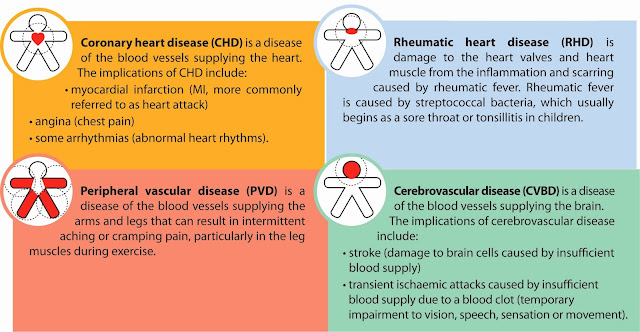 Cardiovascular disease is a disease that affects the cardiovascular system.principally cardiac disease, vascular diseases of the brain and kidney, and peripheral arterial disease.
Cardiovascular disease is a disease that affects the cardiovascular system.principally cardiac disease, vascular diseases of the brain and kidney, and peripheral arterial disease.
Also called heart disease that involve the heart, the blood vessels (arteries, capillaries, and veins) or both.
cardiovascular disease risk factors:
Age, Gender, High Blood Pressure, High Serum Cholesterol Levels, Tobacco Smoking, Consumption of Alchol in Excessive amounts, Sugar Consumption, Family History, Obesity or over weight, Lack of Physical Activity, Diabetis.
how to prevent heart disease:
1. Including low-fat diet rich in fiber like whole grains, plenty of fresh fruits and vegetables for a healthy heart. Avoid Fried and processed foods. Include more Cold water varieties of fish like salmon, tuna, sardines, mackerel, and trout in your diet as unsaturated fats in fish called omega-3 fatty acids are good for heart.
2. Avoid Tobacco smoking or stop smoking for a healthy heart.
3. Consumption of Alchol in a limited way ( recommended daily limits)
4. Reducing the consumption of sugar.
5. Engage in Regular Physical activity like walking, swimming, cycling, aerobics, yoga, etc to maintain good health. Fitness is the key.
6. Control your weight and take care of yourself.
7. Smile a lot. Laughter is the best way to have a happy heart.
 |
| picture credit |
List of Heart Diseases:
Rheumatic
Hypertensive
Ischemic
Cerebrovascular
Inflammatory
Congenital
Coronary Artery
Coronary Artery
 |
| picture credit |
What is Heart attack:
A heart attack is caused when a portion of the heart muscle loses its supply of blood partially or completely.
Signs of a Heart Attack:
1. Pressure in center of chest.
2. Pain in shoulders, neck or arms.
3. Light Headedness or fainting, shortness of breath, sweating, or nausea with or without chest discomfort.
2. Pain in shoulders, neck or arms.
3. Light Headedness or fainting, shortness of breath, sweating, or nausea with or without chest discomfort.
















